 The Sunshine State has always been considered one of the most important swing states in US presidential elections, famously deciding the 2000 election result by a narrow and contested vote margin. Kevin Fahey argues that, if we look at the evidence of recent state-wide and federal elections, Florida tends to lean Republican, and given Trump’s political coalition, is unlikely to be an easy win for the Democrats in 2020. If the Democrats do win Florida this year, he writes, they will very likely have already won the Electoral College with wins in the Midwest.
The Sunshine State has always been considered one of the most important swing states in US presidential elections, famously deciding the 2000 election result by a narrow and contested vote margin. Kevin Fahey argues that, if we look at the evidence of recent state-wide and federal elections, Florida tends to lean Republican, and given Trump’s political coalition, is unlikely to be an easy win for the Democrats in 2020. If the Democrats do win Florida this year, he writes, they will very likely have already won the Electoral College with wins in the Midwest.
- This article is part of our Primary Primers series curated by Rob Ledger (Frankfurt Goethe University) and Peter Finn (Kingston University). Ahead of the 2020 election, this series explores key themes, ideas, concepts, procedures and events that shape, affect and define the US presidential primary process. If you are interested in contributing to the series contact Rob Ledger (ledger@em.uni-frankfurt.de) or Peter Finn (p.finn@kingston.ac.uk).
Florida is often cited as the quintessential swing state. This status comes from its often-close presidential election outcomes, as well as its 29 electoral votes – tied for the 3rd most in the country with New York State. In presidential elections since and including 1992, the average gap between the Democratic and Republican vote share in the Sunshine State has been 2.5 percent. This includes the famous 2000 election, which was decided by 537 votes after a month of recounts, culminating in a Supreme Court ruling.
This bellwether status – meaning that Florida is often considered to be predictive for which way the US as whole will swing — is belied by the rest of the evidence from recent Florida electoral history. Republicans have a decided advantage in the state legislature and in winning state-wide contests. Its congressional delegation provides an edge to Republicans, who hold a 14-13 edge even after losing five seats in 2016 and 2018. Its relatively late location in primary nominating contests – and, in 2008, its partial exclusion from the Democratic convention – have reduced its role in selecting presidential nominees. So how will Florida impact the Democratic presidential primary, the 2020 Presidential election, and the makeup of Congress in the 2020 House of Representatives elections (Florida has no Senate election in 2020)?
First, public opinion polling in Florida indicates a very close election, and possibly an edge for President Donald Trump. In ten polls of head-to-head matchups between Trump and former Vice-President Joseph Biden, the two are essentially tied, with Trump’s 46.7 percent to Biden’s 47.6 percent (in national polls, Biden leads by between 5 and 10 points). Against Vermont Senator Bernie Sanders, who also leads Trump by similar nationwide margins, the contest is also tied, with Trump averaging 47.4 percent and Sanders 48.25 percent across six polls. While the Democratic nominee would all but erase Donald Trump’s 2016 Electoral College victory with a win in Florida, the easier paths to victory run through Wisconsin, Michigan, Pennsylvania, and possibly even Arizona. Thus, while Florida is a large swing state, the Democratic ticket will only win Florida if they have already won the Electoral College. The two maps below from 270towin.com show two alternative scenarios: a Florida-Plus model (top), and a Midwest model (bottom). Trump’s margin of victory in Florida was 100,000 votes – larger than the combined margin of victory in Wisconsin, Michigan, and Pennsylvania.
Figure 1 – The Democrats don’t need Florida to win the White House in 2020
Second, Florida is unlikely to influence the 2020 Democratic nomination contest. Florida’s primary this year is on the 17th of March. By this point, 27 primaries and caucuses will have already occurred, and nearly 1,900 of the convention’s almost 4,000 delegates will have been chosen. Florida’s 219 delegates are unlikely to be kingmakers if the contest is unsettled at this stage; moreover, since 1992 Florida’s primary has never been closely decided. Florida has tried to obtain more relevance in presidential primaries, but its decision to “jump ahead” in the primary calendar in 2008 resulted in half of its delegates being stripped away by the Democratic National Committee. If three or four valid candidates remain by Florida, those delegates may matter, but none of the candidates are natural fits for the state’s Democratic voters, and it is unlikely the state will be a deciding factor at the nominating convention.
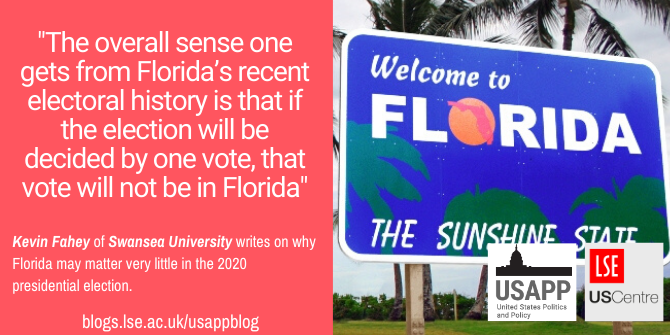
“Welcome To Florida Sign” by DonkeyHotey is licensed under CC BY 2.0
Third, despite Florida’s swing-state status the Sunshine State decidedly leans Republican. Rick Scott, the state’s junior senator elected in 2018 – and former two-term governor – won each of his elections by small margins. Florida’s elected Cabinet officers have been decidedly Republican since 2002 – only two individuals (Alex Sink 2007-2011 and Nikki Fried 2019-present) have been Democrats, meaning Republicans have won 14 out of 16 state-wide executive posts. Republicans held 17 of the state’s 27 Congressional districts in 2012, despite Democrat Barack Obama’s narrow win in the state. This suggests that Florida is not a true coin-flip in politics, but a state that Republicans will win unless Democrats do well nationwide. Data from Dave Leip’s U.S. Election Atlas show this with the case of Rick Scott (Figure 2).
Figure 2 – Rick Scott’s performance in Florida elections, 2010-2018
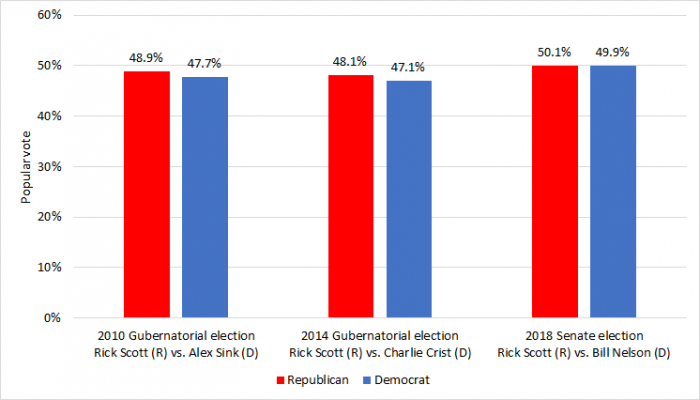
Source: U.S. Election Atlas.
Fourth, President Trump’s political coalition makes Florida less competitive than other states. The Democratic coalition of minority voters, young voters, urbanites, and women assembled by Barack Obama in 2008 is weaker in Florida than in states such as Colorado or Virginia. Take Florida’s Cuban-American population; unlike most other minority groups, Cuban-Americans are historically a Republican constituency – only in recent elections have Cuban-Americans begun supporting Democrats. By contrast, Trump managed to win among both voters with and without college degrees in Florida, despite evidence that education was predictive of Trump’s support.
Fifth, Democrats in the House of Representatives have few opportunities to expand their majority, while Republicans have few opportunities to win back the majority in Florida. Only a handful of districts (the 7th, 9th, 13th, 18th, 25th, and 27th) have a Cook Partisan Voting Index of D/R+5 or less, and of these, none are considered to be Toss-Up districts. Only another large wave election will change the composition of Florida’s congressional delegation. Florida has no Senate race this year either, although the other Republican Senator, Marco Rubio, won both of his Senate races by comfortable margins.
These factors combine to make Florida an uphill battle for Democrats, but victory is still no sure thing for President Trump. First, he is quite unpopular, even in Florida. A set of fifteen polls of Trump’s approval in Florida find him underwater by roughly the same margin as his national numbers, 42-48 percent. Democrats have picked up five US House of Representatives seats in the last two election cycles, and Republican retirements in two safe-red Florida congressional districts (the 3rd and the 19th) may indicate Republicans anticipate Trump’s defeat. Florida is likelier than not to be the site of a major hurricane this year; government administration of hurricanes in 2016, 2005, and 2004 all contributed to narratives of government – and presidential – incompetence (though a near miss could have the opposite effect).
The overall sense one gets from Florida’s recent electoral history is that if the election will be decided by one vote, that vote will not be in Florida, as it was in 2000. Instead, Republicans should continue to win state-wide and federal elections unless Democrats are having a very good year. Democrats do not need Florida to win, but could easily win the state, and its 29 Electoral Votes, if Trump’s approval rating translates into votes. Additionally, do not expect Florida to matter significantly in the Democratic presidential primary this year, unless there are still three or four valid candidates in the race by mid-March. Florida, despite its historical importance, may end up little more than a footnote in the story of the 2020 election.
Please read our comments policy before commenting.
Note: This article gives the views of the author, and not the position of USAPP – American Politics and Policy, nor of the London School of Economics.
Shortened URL for this post: http://bit.ly/2Sr5cj3
About the author
 Kevin Fahey – Swansea University
Kevin Fahey – Swansea University
Kevin Fahey is a Lecturer in Politics in the Department of Political & Cultural Studies at Swansea University. He studies study political institutions and elite behavior, with specialization in subnational politics.


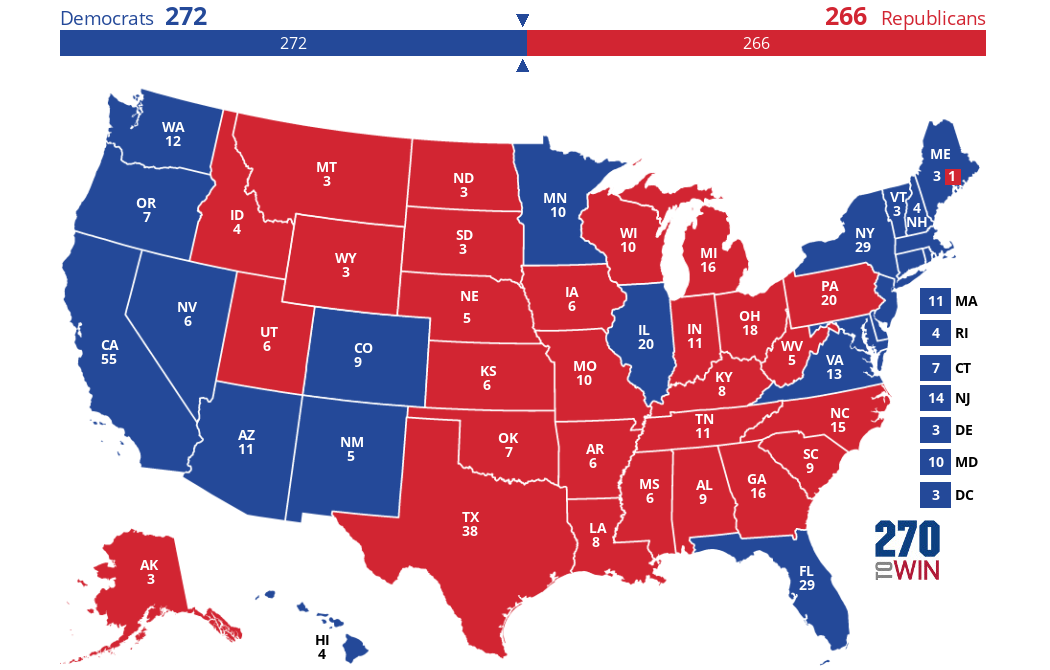
 Click the map to create your own at
Click the map to create your own at 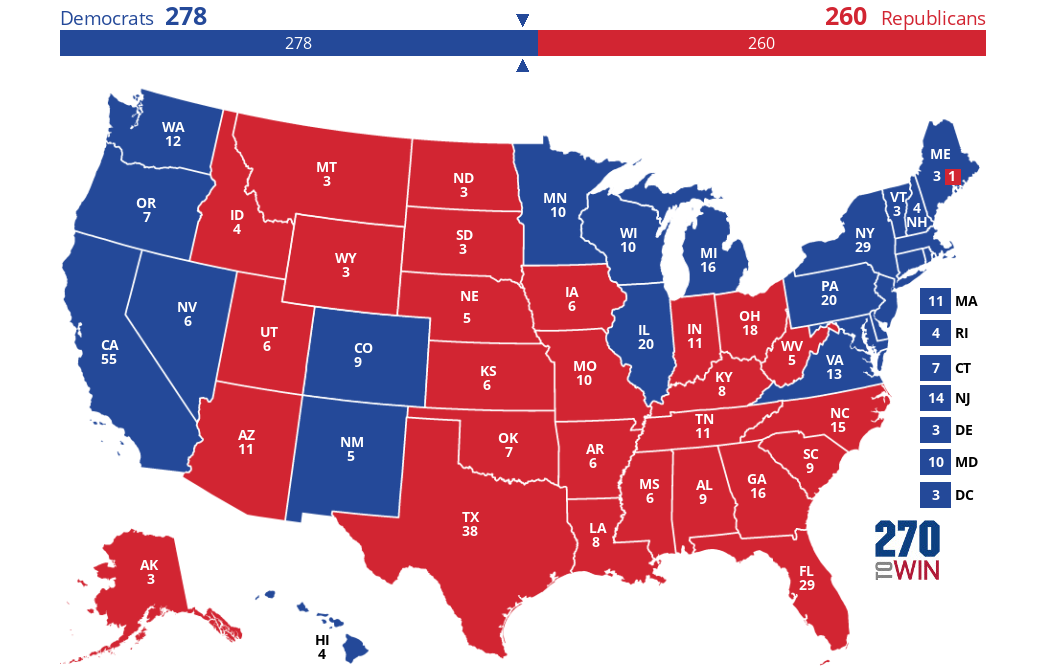
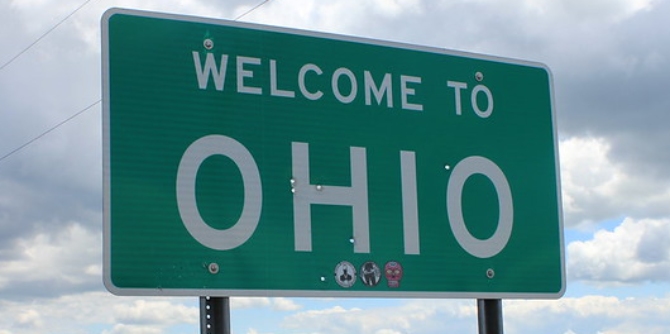
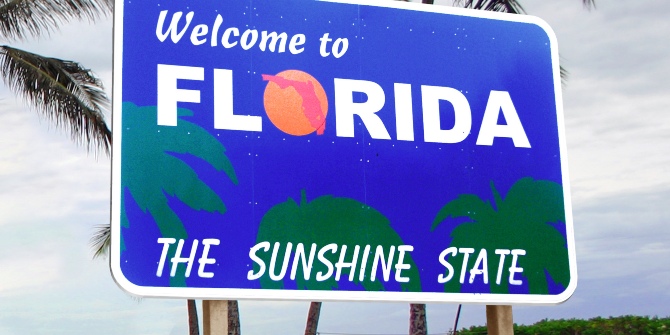



The author’s opinion is flawed. Florida may not technically decide the Presidential election but there is no doubt that if florida decidedly votes out Trump then the fact the “Republicans have a decided advantage in the state legislature and in winning state-wide contests” would be demonstrably in jeopardy come the next statewide elections!
The gradual Republican takeover as the majority was borne out of a plan to begin with local school boards, city/county commissions and build from there to take House, Senate and Statewide offices.
This process took the Republican party 20 odd years to accomplish. With a commanding defeat of Trump, the Democrats, if they don’t screw it up as they have in the past, may be able to take advantage and change the political structure of the state of Florida in a shorter period of time.
Here’s to the little Welsh Fahey on the way!
Cheers, Tigger.